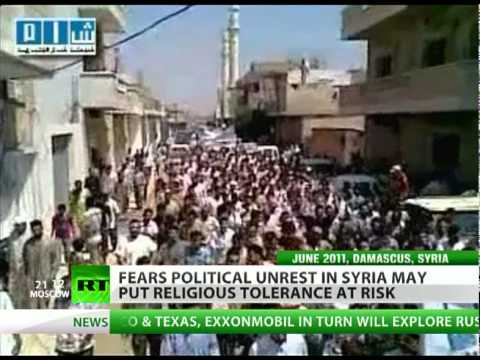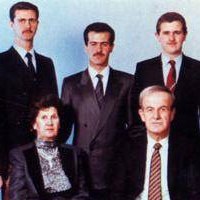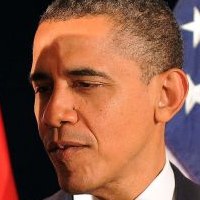![]()
Wed, Sept 7, 2011 | Middle East Forum | The American Spectator | by Aymenn Jawad Al-Tamimi
A Sectarian Issue
As Gaddafi’s regime crumbles, speculation has started to arise over whether the Syrian opposition will now be emboldened in their struggle against Assad. Naturally, this raises the question of precisely what course the unrest in Syria will take. Is it a general uprising against the repressive Baathist regime, or is it really a sectarian affair, pitting minority Shi’a Alawites against a Sunni majority, while Christians generally side with the former and Kurds with the latter?
Rather than assessing anecdotal evidence from within Syria, it might be more instructive to look at how the country’s neighbors view the instability. Indeed, it is particularly striking that division of opinion about Syria is based on entirely sectarian grounds.
Start off with the case of Iraq. It is of course in Iraq’s interests to see the Assad regime embroiled in turmoil, for not only has Assad facilitated the infiltration of foreign Sunni insurgents into the country until the unrest, but Syria has also been a destination of choice for many Iraqi refugees — particularly Christians who comprise 5 percent of Iraq’s population but 40 percent of refugees — fleeing from violence within their homeland since the 2003 invasion.
With the onset of the protests in Syria, Iraqi refugees have begun returning home, a development that is vital if Iraq is not going to suffer from problems of “brain drain” that could severely impede the nation’s economic development.
However, Iraq’s political elite does not view the Syrian unrest in these terms. Instead, we witness the Shi’a politicians standing with Assad, while the Sunni and Kurdish parliamentarians openly back the opposition. For example, in light of events in Syria, the Shi’ite Prime Minister Nouri al-Maliki has warned that “Zionism and Israel” are poised to take advantage of the instability caused by the protests to bring about the “disintegration and internal erosion of the Arab countries.”
Since his gaining a second term in power last December, al-Maliki has cultivated close economic and diplomatic ties with Assad, as the latter was eventually persuaded by Iran to back al-Maliki rather than Ayad Allawi for the premier. Meanwhile, the radical Shi’ite cleric and key “ally” of al-Maliki — Muqtada al-Sadr — called Assad a “brother” for opposing the United States, and said that events in Syria are very different from the “popular revolutions” in Tunisia and Egypt.
As for the Sunnis, a clear case in point is Osama al-Nujaifi, a prominent member from Mosul of Allawi’s Sunni-dominated al-Iraqiya bloc and speaker for the Iraqi parliament. He strongly denounced the repression of protests by Assad, and called on him to “stop the bleeding” for the sake of the Syrian people.
Likewise, in Lebanon it is noteworthy how the traditionally pro-Syrian factions have divided between Christians and Shi’a on the one hand as opposed to the Sunnis on the other. While as-Safir newspaper — a publication affiliated with pro-Syrian Sunnis — calls on the Syrian regime to cease using force against demonstrators, Hezbollah’s leader Hassan Nasrallah backs Assad (although his deputy Na’im Qassem, in a rather mild tone, advised the regime to exercise restraint in utilizing violence against the protestors), as does Michel Aoun of the pro-Syrian Maronite faction known as the “Free Patriotic Movement.”
We further have the example of George Saliba, the Syriac Orthodox bishop of Lebanon. Although unaffiliated with a political party, his interview with ad-Dunya TV last month had the Syrian unrest in mind when he characterized protests across the region as part of a Jewish conspiracy.
Besides reflecting his own anti-Semitism, the fact that he should believe there is a conspiracy at all is clearly tied to his belief that the Assad regime serves as the protector of Syrian Christians.
In a somewhat similar vein, the Melkite Greek patriarch Gregory III Laham, based in Damascus, has repeatedly warned that the demonstrations against Assad are being hijacked by “armed criminals” and other unidentified sinister forces.
Finally, we turn to the “resistance” bloc more generally. In July, I had wondered whether Turkey could abandon the bloc in light of intensifying tensions with Iran over what to do about Syria. In fact, Turkey could well establish a buffer zone inside Syria soon to prevent a refugee crisis along its southern border.
Nevertheless, as Barry Rubin correctly explained to me, the issue is not that Turkey is “leaving” the resistance bloc, but simply joining the Sunni side of it, together with Hamas, which has also condemned Assad’s repression of the protests and has consequently lost at least a significant proportion of financial support from Iran.
All this evidence therefore suggests that the conflict in Syria is indeed a sectarian issue. After all, what do we know about events inside Syria that the country’s neighbors don’t? The implications of such a conclusion do not bode well for Syria’s future. Many pundits have recently wondered whether Libya could be “another Iraq.” Yet it is highly unlikely that Libya, sparsely populated and vast as it is, could ever witness anything like the bloody sectarian fighting my relatives lived through in the Baghdad civil war in 2006. They should really be asking such questions of Syria.
Aymenn Jawad Al-Tamimi is a student at Brasenose College, Oxford University, and an intern at the Middle East Forum.



 RSS
RSS











A Sectarian Issue | Middle East News, Articles, Background, Opinion, Analysis http://t.co/WrIwlle
A Sectarian Issue | Middle East News, Articles, Background, Opinion, Analysis http://t.co/WrIwlle